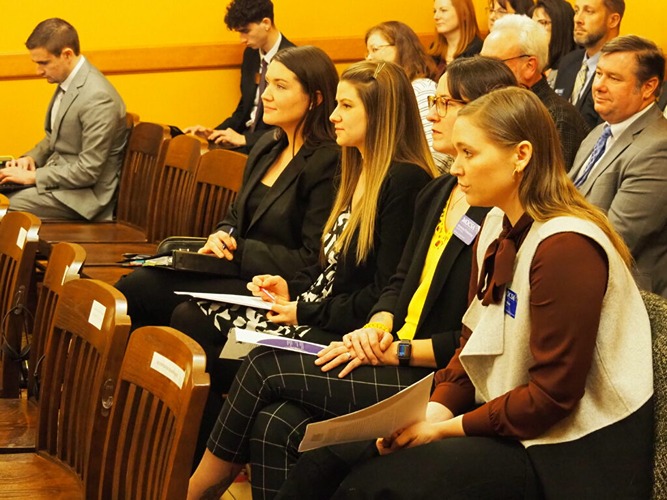By Tim Carpenter, Kansas Reflector
TOPEKA, Kan. — Advocates for domestic violence and sexual abuse survivors propose the Kansas Legislature amend state law to provide judges with authority to issue longer protection orders in response to instances of alleged abuse, assault, stalking and human trafficking.
A coalition of organizations made a case Tuesday to the House Judiciary Committee for amending state statute so the length of protective orders could be adopted for a period of not less than two years and not more than five years. The legislation before the committee also would enable plaintiffs to seek renewal of protective orders for periods of two- to five-years.
Under current law, orders in Kansas courts were fixed at one year. Individuals do have an opportunity to apply for one-year extensions.
A measure comparable to House Bill 2029 was introduced during the 2022 legislative session but didn’t gain traction in the House.
Emily Voss, advocacy and outreach specialist at the Metropolitan Organization to Counter Sexual Assault, said the legal process to obtain a protection order from the courts was wrought with barriers. Doubling the length of an initial order to two years and expanding the range to five years would provide victims breathing room as they worked through difficult personal circumstances, she said.
“Getting through the process is challenging under the best of circumstances, given concerns about childcare, transportation and navigating a complex legal system,” Voss said. “In the nearly five years I’ve been doing this work, I’ve never had a client that hasn’t express concern over one of these things ahead of protection order court.”
Victoria Pickering, director of advocacy for MOCSA’s work in Johnson and Wyandotte counties, said protection orders were a tool to reduce likelihood of retaliation or intimidation from perpetrators.
A one-year protection order, she said, typically conflicted with the 18- to 24-month timeline for completing a prosecution for sexual assault. The COVID-19 pandemic created a backlog of cases resulting in trials occurring three years after an assault, she said.
Jessa Farmer, public policy coordinator for the Kansas Coalition Against Sexual and Domestic Violence, said current Kansas statute left victims who endured years of violence to refile annually for extension of a protection order. She said the burden was on victims to navigate the court system, often without legal representation due to a shortage of attorneys in Kansas willing to take these cases.
The shift to a two- to five-year order would increase efficiency of the court system and allow urgent cases to be addressed more rapidly, she said.
“Applying for a protection order is a step toward independence, but it can also be a threat to an abuser, a stalker or a trafficker’s sense of power and control over their victim. This can increase the danger, violence and risk of death to a victim,” Farmer said.
Mike Burgess, director of policy for the Disability Rights Center of Kansas, said the legal advocacy organization recommended the House committee strengthen the legislation. The single one-year extension should be revised to avoid annual renewals, he said, and a two-year minimum made sense.
“We are supportive of this change,” he said. “However, there are some situations when five years is not long enough.”
He said the bill could be adjusted to grant judges authority to approve successive extensions of protection orders for up to five years if good cause was shown by plaintiffs.























